Generally, regret is a feeling that we express when we feel bad for doing or not doing something. You will hardly find someone who never regretted any of their behaviors or actions. I find some of my ESL students make mistakes in their assignments, miss interesting lectures and forget the assessment dates, and later regret it.
However, most of them face problems expressing their regret verbally or in emails or texts. No worries! I’ll discuss some very common and smart ways of expressing regret in English in detail in this post.
There are many phrases you can use to regret doing or not doing something, such as “I regret…”, “I wish I had…”, “I repent for…”, and “I should have….” The following table shows 11 different expressions with examples that you can use to express regret.
Are you looking for a book or a guide to help you learn and improve your English? You may try English Made Easy Volume One: A New ESL Approach: Learning English Through Pictures (Amazon Link).
Table of Contents
- I regret…
- I wish I had…
- I feel bad for…
- I feel sorry about…
- I am regretful for…
- I am repentant about…
- I should have…
- I should not have…
- If I had…
- If only I had…
- I repent for…
- A Sample Conversation on Expressing Regret in English
- Takeaway Words
- In Conclusion
- 10 Frequently Asked Questions Related to Expressing Regret in English
| Phrases | Example Sentences |
| I regret… | I regret watching such a dull movie. I regret not watching such a good movie before. |
| I wish I had… | I wish I had my car now. I wish I had studied more before the exam. |
| I feel bad for… | I feel bad for leaving the previous team. I feel bad for not going with them. |
| I feel sorry about… | I feel sorry about doing this. I feel sorry about not taking her there. |
| I am regretful for… | I am regretful of my deeds. I am regretful missing the college reunion. I am regretful for not attending the college reunion. |
| I am repentant about… | I am repentant about playing without fitness. I am repentant about not playing the match. |
| I should have… | I should have texted you earlier. |
| I should not have… | I should not have allowed him to go there. |
| If I had… | If I had the bike now, I could join you. If I had gone there on time, I could have met him. |
| If I only had… | If I only had followed your instruction. |
| I repent for… | I repent for rejecting the previous job offer. I repent for not accepting the previous job offer. |
I hope these examples help you express regret for important or silly things. To know the correct use of the above phrases in sentences, I expect you to read till the end. And I am sure you’ll not regret giving your time on that.
In the later part of the post, I’ll talk about the structure you might follow while using those phrases. I’ll also give more examples relevant to situations someone may repent for.
I regret…
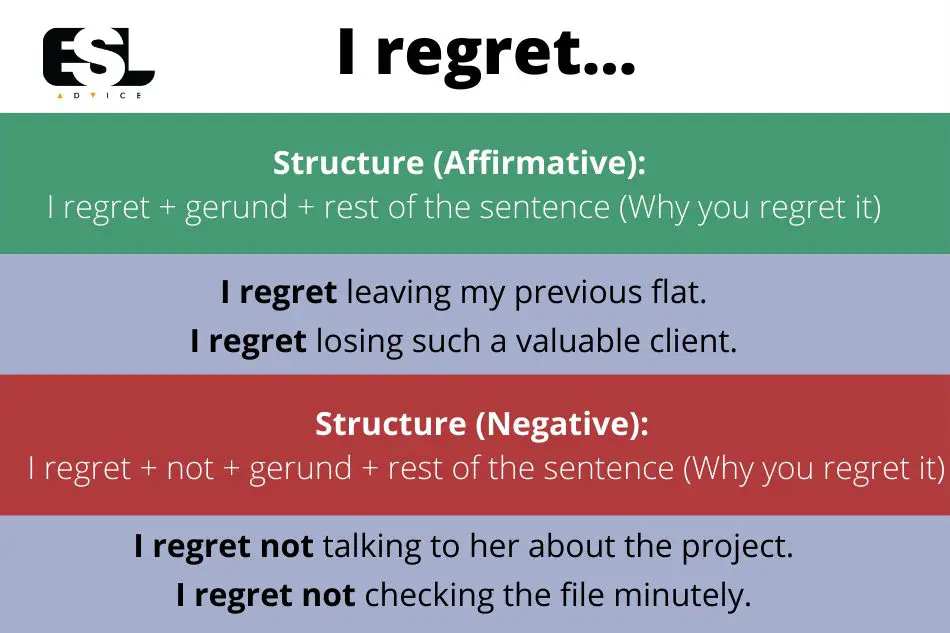
Structure (Affirmative): I regret + gerund + rest of the sentence (The reason why you regret it)
Example 1: I regret leaving my previous flat.
Example 2: I regret buying this car at this price.
Example 3: I regret losing such a valuable client.
Structure (Negative): I regret + not + gerund + rest of the sentence (The reason why you regret it)
Example 1: I regret not talking to her about the project.
Example 2: I regret not checking the file minutely.
Example 3: I regret not sending him abroad for higher studies.
I wish I had…
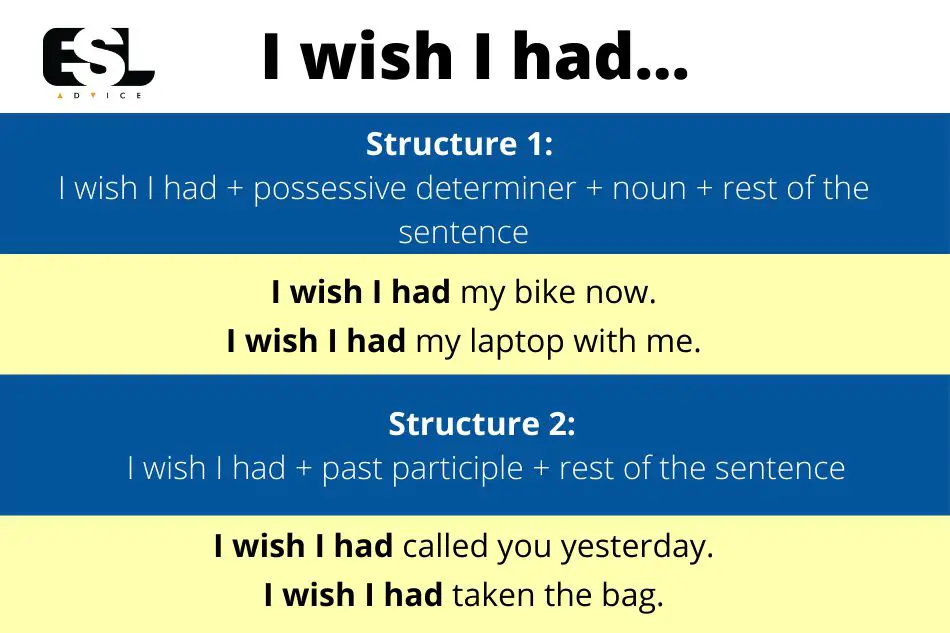
Structure: I wish I had + possessive determiner + noun + rest of the sentence
Example 1: I wish I had my bike now.
Example 2: I wish I had my laptop with me.
Example 3: I wish I had my friend on this tour.
Structure: I wish I had + past participle + rest of the sentence
Example 1: I wish I had called you yesterday.
Example 2: I wish I had read the terms and conditions carefully.
Example 3: I wish I had taken the bag.
I feel bad for…
Structure (Affirmative): I feel bad for + gerund + rest of the sentence (The reason why you regret it)
Example 1: I feel bad for drinking this juice.
Example 2: I feel bad for joining them as a guide.
Example 3: I feel bad for giving him my phone number.
Structure (Negative): I feel bad for + not + gerund + rest of the sentence (The reason why you regret it)
Example 1: I feel bad for not tasting this pizza before.
Example 2: I feel bad for not visiting your village.
Example 3: I feel bad for not learning English early.
I feel sorry about…
Structure (Affirmative): I feel sorry about + gerund + rest of the sentence (The reason why you regret it)
Example 1: I feel sorry about attending the seminar.
Example 2: I feel sorry about missing his class.
Example 3: I feel sorry about inviting them to the program.
Structure (Negative): I feel sorry about + not + gerund + rest of the sentence (The reason why you regret it)
Example 1: I feel sorry about not informing you earlier.
Example 2: I feel sorry about not talking to him at the event.
Example 3: I feel sorry about not accepting the invitation to the program.
I am regretful for…
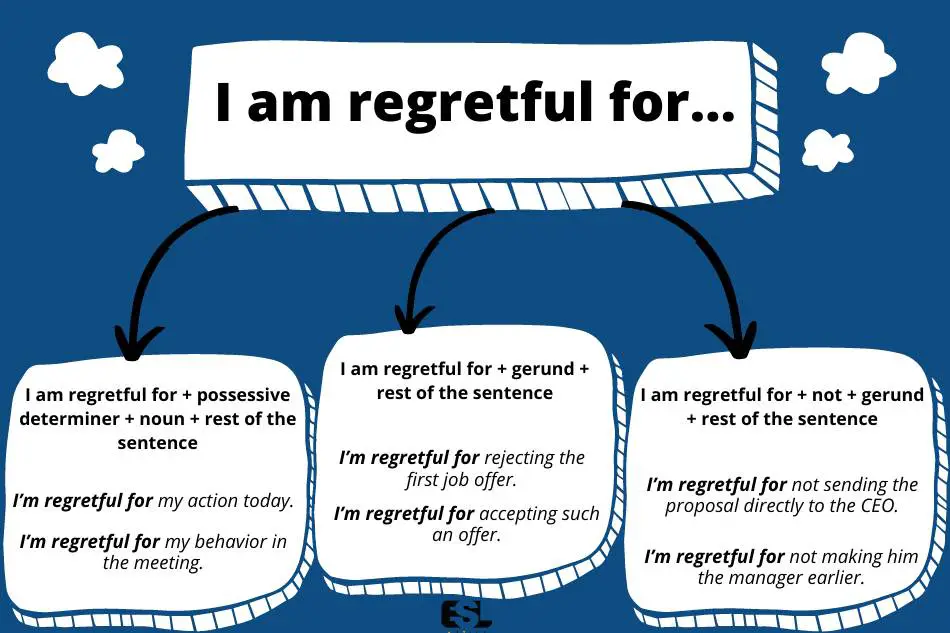
Structure : I am regretful for + possessive determiner + noun + rest of the sentence
Example 1: I’m regretful of my action today.
Example 2: I’m regretful of my behavior in the meeting.
Example 3: I’m regretful of my mistakes.
Structure (Affirmative): I am regretful for + gerund + rest of the sentence (The reason why you regret it)
Example 1: I’m regretful for rejecting the first job offer.
Example 2: I’m regretful for sending the incomplete file to my boss.
Example 3: I’m regretful for accepting such an offer.
Structure (Negative): I am regretful for + not + gerund + rest of the sentence (The reason why you regret it)
Example 1: I’m regretful for not sending the proposal directly to the CEO.
Example 2: I’m regretful for not making him the manager earlier.
Example 3: I’m regretful for not asking for the schedule before the event.
I am repentant about…
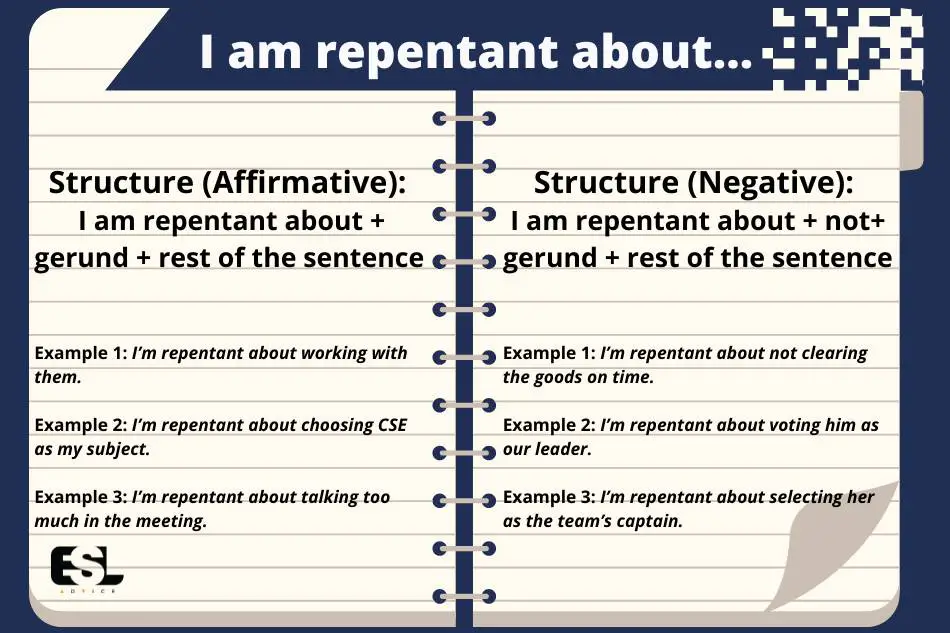
Structure (Affirmative): I am repentant about + gerund + rest of the sentence (The reason why you regret it)
Example 1: I’m repentant about working with them.
Example 2: I’m repentant about choosing CSE as my subject.
Example 3: I’m repentant about talking too much in the meeting.
Structure (Negative): I am repentant about + not + gerund + rest of the sentence (The reason why you regret it)
Example 1: I’m repentant about not clearing the goods on time.
Example 2: I’m repentant about voting him as our leader.
Example 3: I’m repentant about selecting her as the team’s captain.
I should have…
Structure: I should have + past participle + rest of the sentence (The reason why you regret it)
Example 1: I should’ve knocked you as early as possible.
Example 2: I should’ve informed you once he was there.
Example 3: I should’ve sent them before you arrived.
I should not have…
Structure: I should not have + past participle + rest of the sentence (The reason why you regret it)
Example 1: I shouldn’t have poked him.
Example 2: I shouldn’t have talked to them before others.
Example 3: I shouldn’t have called his father that night.
If I had…
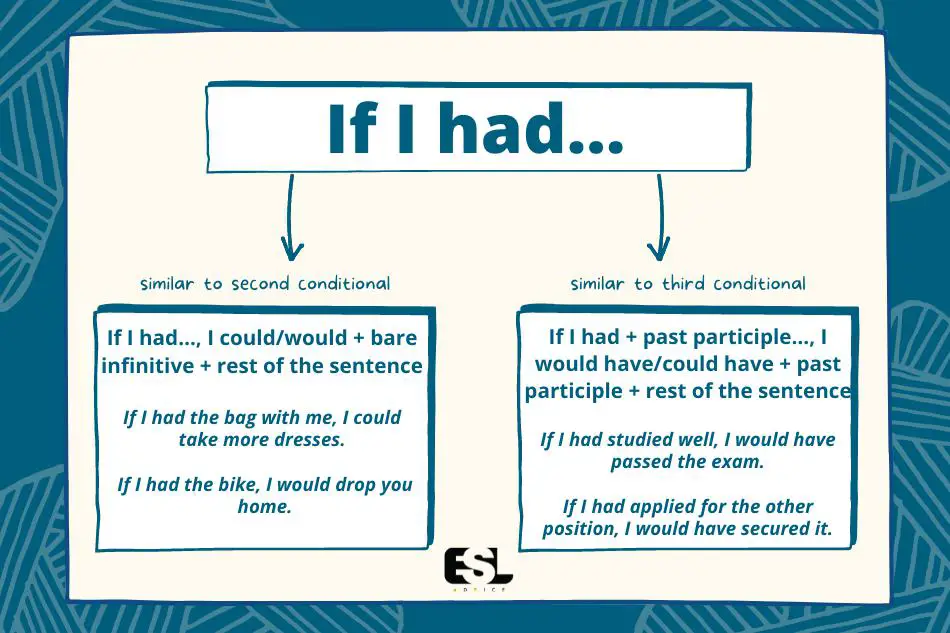
Structure: If I had…, I could/would + bare infinitive + rest of the sentence (Similar to the structure of the second conditional sentence)
Example 1: If I had the bag with me, I could take more dresses.
Example 2: If I had the bike, I would drop you home.
Example 3: If I had his phone number, I could wish her.
Structure: If I had + past participle…, I would have/could have + past participle + rest of the sentence (Similar to the structure of the third conditional sentence)
Example 1: If I had studied well, I would have passed the exam.
Example 2: If I had checked the documents minutely, I would have found the errors.
Example 3: If I had applied for the other position, I would have secured it.
If only I had…
Structure: If I only had + past participle + rest of the sentence (The reason why you regret it)
Example 1: If only I had counted the cash again.
Example 2: If only I had ridden the bike slowly.
Example 3: If only I had informed them about the discount.
I repent for…

Structure (Affirmative): I repent for + gerund + rest of the sentence (The reason why you regret it)
Example 1: I repent for adding him as a teammate.
Example 2: I repent for making him the coach.
Example 3: I repent for buying this item.
Structure (Negative): I repent for + not + gerund + rest of the sentence (The reason why you regret it)
Example 1: I repent for not selling the house at that time.
Example 2: I repent for not asking them to taste the desserts.
Example 3: I repent for not talking about the other deal.
A Sample Conversation on Expressing Regret in English
Ronald: Hi, Tina! How’s it going?
Tina: Hey, Ron. I’m good. What about you – you look so cheerful today!
Ronald: Yep. And for good reasons.
Tina: Come on, fill me in.
Ronald: Well… the job I applied for last month for the Technical Officer position at OXY Inc…
Tina: And they want you?
Ronald: Of course they do! Can you imagine? That company is a giant in network assistance services.
Tina: God, you’re one lucky fellow.
Ronald: What? Aren’t you happy for me?
Tina: Definitely, I’m. But… oh, never mind.
Ronald: Tell me.
Tina: Actually, I had an invitation from OXY last week for a top executive position. You know what? I turned that offer down.
Ronald: YOU DID WHAT! Are you nuts? How could you…
Tina: I know, right? My only mistake was to miss out on their annual benefits package. It was on the very last page of their invitation letter… and I stopped myself from reading it up. Shame on me.
Ronald: Unbelievable.
Tina: I must’ve been too hasty. If I had even scanned through the last page, I would’ve signed a contract with them by now.
Ronald: And the benefits you’re getting here are peanuts to that of OXY.
Tina: Oh, I regret this… I wish I had a time-reversal button, so I could go back and undo my blunder.
Takeaway Words
Nuts (adjective) = someone who’s not thinking straight or doing things in a messy way
Hasty (adjective) = being in an excessive hurry while doing something
In Conclusion
In our personal and professional lives, from choosing or ordering food at a restaurant to selecting the right career path, we may regret making mistakes. No matter how careful or sincere we are, we make mistakes, many or some, silly or severe, and regret them later.
I hope the above discussion will help you express your regret properly to the people you want to share your feelings with. However, life is too short to waste regretting what you have already done. You should learn from your mistakes and move forward.
We all do things we desperately wish we could undo. Those regrets just become part of who we are, along with everything else. To spend time trying to change that, well, it’s like chasing clouds.
Libba Bray
I hope you don’t regret giving your time to read this post.
Thank you!
Happy learning!
10 Frequently Asked Questions Related to Expressing Regret in English
1. Why is it important to express regret appropriately in English?
Expressing regret shows accountability for one’s actions and helps mend relationships by acknowledging the oversight or mistake.
2. What are common phrases to express regret?
Phrases like “I regret that…”, “I’m sorry for…”, “I wish I hadn’t…”, or “If I could go back, I would…” can convey feelings of regret.
3. How can I ensure my expression of regret is sincere?
Being genuine in your tone, acknowledging the impact of your actions, and avoiding making excuses can make your regret feel sincere.
4. Is it okay to express regret even if I don’t think I was wrong?
While it’s essential to be genuine, expressing regret for how a situation turned out or the feelings it evoked, even if you don’t believe you were wrong, can still be meaningful.
5. How can I make amends after expressing regret?
Offering a solution, making it up to the person, or ensuring you don’t repeat the mistake can be ways to make amends.
6. What’s the difference between expressing regret and apologizing?
While both acknowledge a mistake, expressing regret focuses on the feeling of sadness or disappointment about the action, whereas an apology seeks forgiveness for the act.
7. How can body language enhance the expression of regret?
Maintaining eye contact, having a sincere tone, and adopting a humble posture can reinforce the genuineness of your regret.
8. How should I respond if my expression of regret isn’t accepted?
Respect the other person’s feelings, give them time, and understand that healing might take time.
9. Are there cultural nuances to expressing regret?
Yes, the way regret is expressed and received can vary across cultures. It’s essential to be aware of cultural norms and sensitivities.
10. How can I teach children to express regret effectively?
Modeling the behavior, discussing the importance of accountability, and encouraging them to think about the impact of their actions can help children learn to express regret.

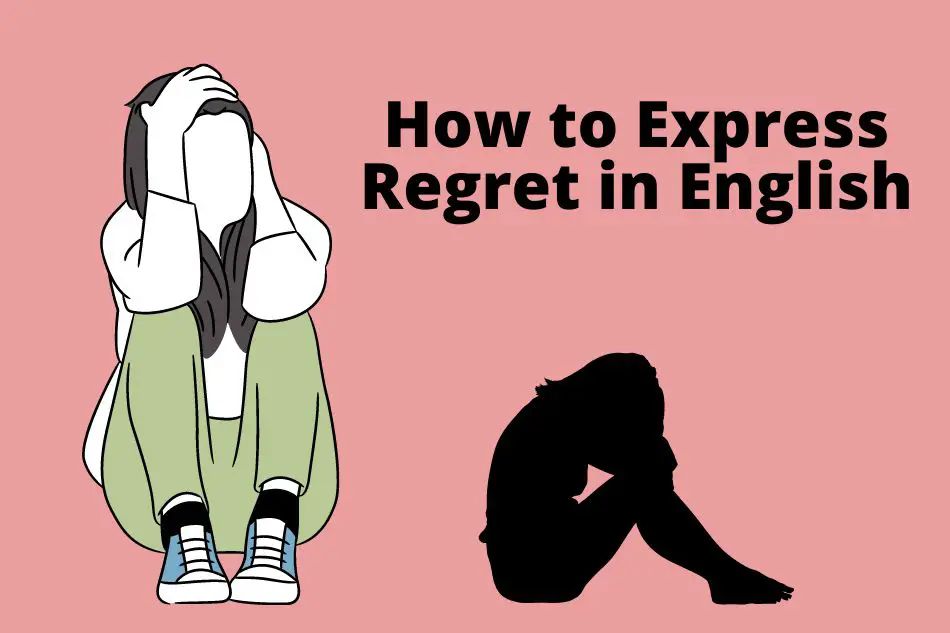




2 thoughts on “How to Express Regret in English”